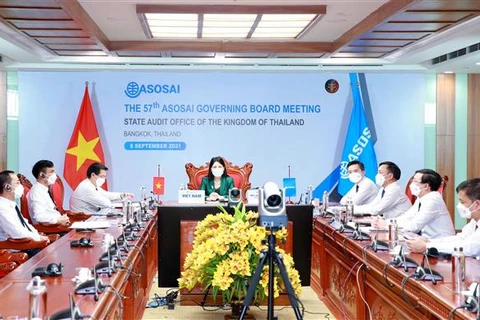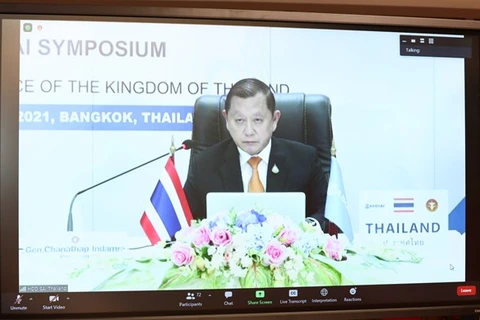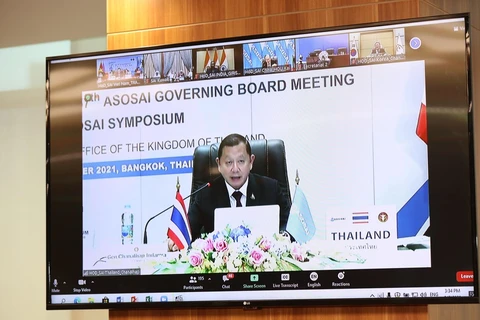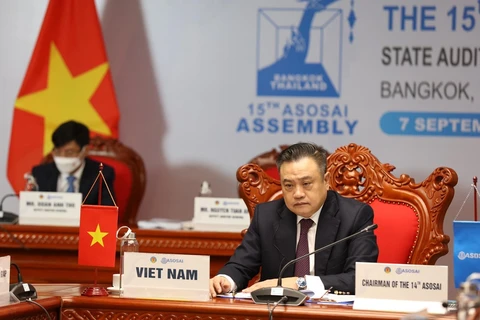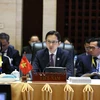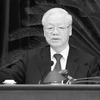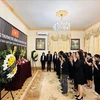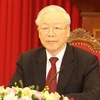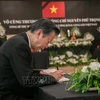 Delegation of State Audit Office of Vietnam chairs discussion on SAIs and Encouraging for the Achievement of SDGs (Photo: VNA)
Delegation of State Audit Office of Vietnam chairs discussion on SAIs and Encouraging for the Achievement of SDGs (Photo: VNA) Hanoi (VNA) – Vietnam shared its experience at the 8th ASOSAI Symposium, held via teleconference on September 8, with the theme "The ASOSAI and the Next Normal: Resilience amidst Challenges”.
The event focused on four topics: SAIs and Promoting Good Governance in the Next Normal; SAIs and Encouraging for the Achievement of SDGs; SAIs and Leveraging by using Advanced Technologies for Public Sector Auditing; and SAIs and Responding to Disaster and Pandemic Emerging Issues.
The State Audit Office of Vietnam (SAV) chaired the discussion on SAIs and Encouraging for the Achievement of SDGs, and shared experience during the discussion on SAIs and Leveraging by using Advanced Technologies for Public Sector Auditing.
Audit points out many shortcomings and limitations
Nguyen Luong Thuyet, Director of the SAV’s Department of General Affairs, said that in the 2018-2021 period, the audit office has paid attention to most of the Government's sustainable development activities. Many revelations from audit activities have helped management agencies to promptly correct shortcomings and limitations and contribute significantly to achieving the goals under the National Action Plan on implementation of the 2030 Agenda for Sustainable Development.
Through the audit of the national target programmes, SAV has pointed out the shortcomings and limitations in the implementation of the programmes, such as the ineffective coordination among ministries, sectors and localities, limited resources mobilised to meet financial needs.
In the period, the office has promoted environmental audit, a new field of auditing in Vietnam, which shows that the issuance of guiding documents on environmental management is inconsistent, the verification and approval of dossiers on and licensing of environmental protection projects and the treatment of wastes remain limited.
Thuyet said that the State Audit Office of Vietnam has recommended relevant agencies to strengthen management, perfect regulations and sanctions against environmental violations, thus contributing to raising awareness of businesses, authorities and people on environmental protection, and gradually improving the quality of the livelihood of people in the audited localities.
During the discussion, Thuyet shared some effective measures in State audit activities in Vietnam. The first is to closely follow the Party's policies and the State's laws on sustainable development to develop an audit plan to best support the Government and the National Assembly in socio-economic development activities, and ensure sustainable development goals in accordance with the National Action Plan on implementation of the 2030 Agenda for Sustainable Development.
The second is to promote the research and application of science and technology in audit activities, with focus on developing new methods of collecting audit evidence, in line with the audit requirements and objectives in implementation of sustainable development goals.
The third is to develop projects to strengthen the organisational apparatus, and develop human resources of the State Audit Office.
The fourth is to intensify international cooperation, both bilaterally and multilaterally, to consult and share experience in audit activities of Vietnam's sustainable development goals and learn from international experience in this field. And
Finally, it is important to step up collaboration between relevant agencies and organisations to exchange and share experience in and knowledge on socio-economic development in general and sustainable development in particular.
To use AI to manage data
During the discussion on using advanced technologies for public sector auditing, the Vietnamese representative said the Vietnamese Government is building national databases on financial information. It is expected that by the end of this year, the country will have completed six major national databases with over 100 national information systems. These are digital resources that need to be tapped in auditing activities through the development of the SAV's specialised databases.
Through the medium of auditing, recordkeeping, internal research and training, SAV has now in the possession of a huge amount of data warehouses accumulated over years that has not been organised, sorted, and effectively exploited. The aforementioned raw data warehouses need to be organised and arranged automatically by the use AI to form Big Data for auditing works.
SAV is in the gradua progress of conducting audits of IT systems and national databases at the State Bank of Vietnam, the General Department of Taxation, the General Department of Customs and the Vietnam Social Security and has achieved several promising results.
Regarding future orientations for IT audit implementation at SAV, the Vietnamese representative said that it will continue completing legal framework and detailed guidance on how to conduct IT audits that have the focus on public digital resources; and conduct annually a preliminary survey of the public digital resource system and establish a specialised database of public digital resources as the focus to gradually build a specialised auditing database. In particular, the focus is placed on data that are available for sharing on Vietnam’s national databases./.

